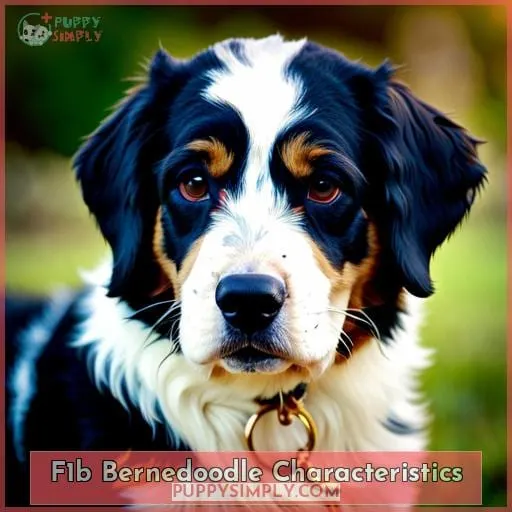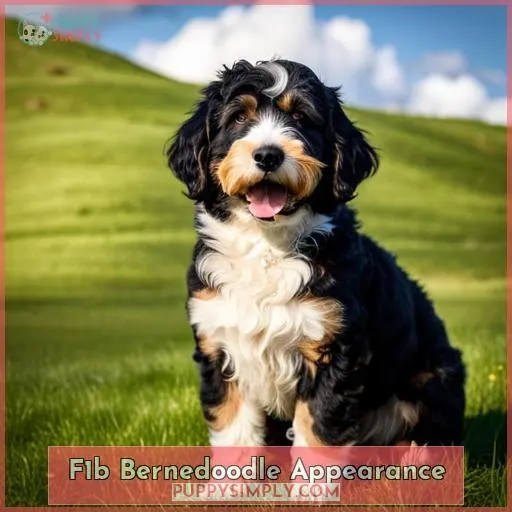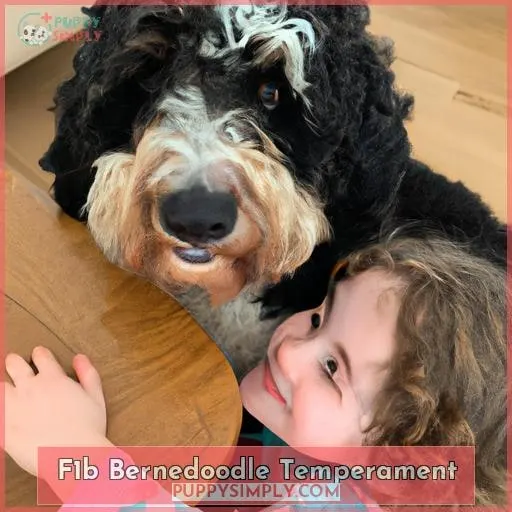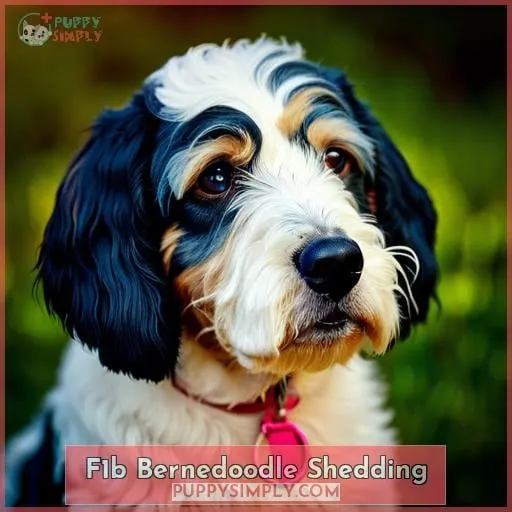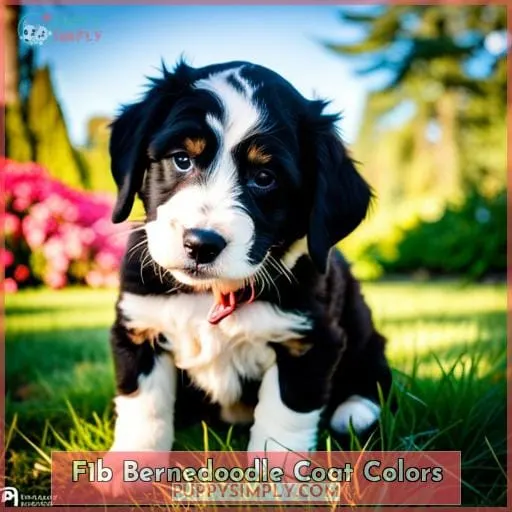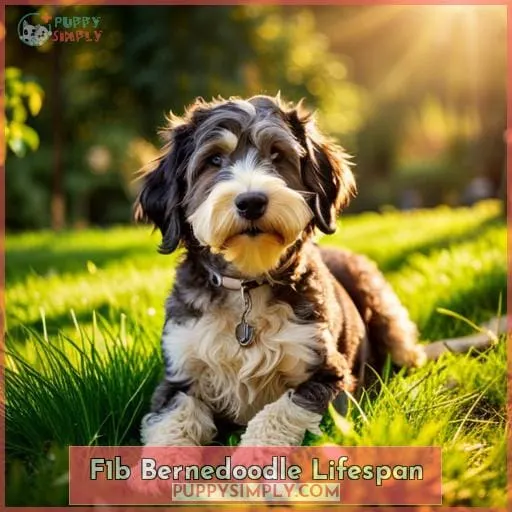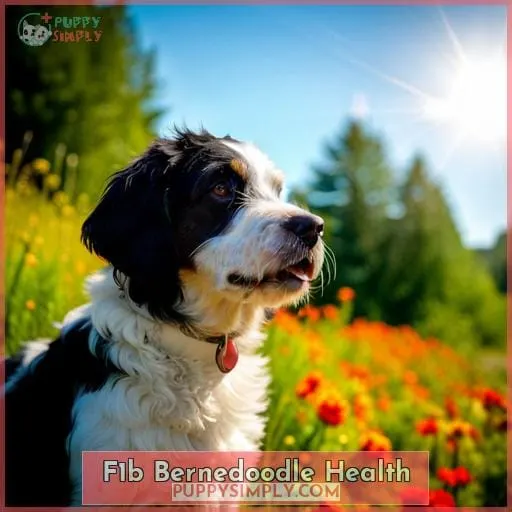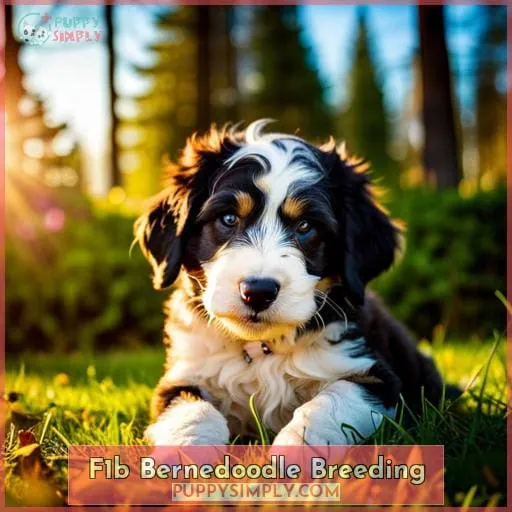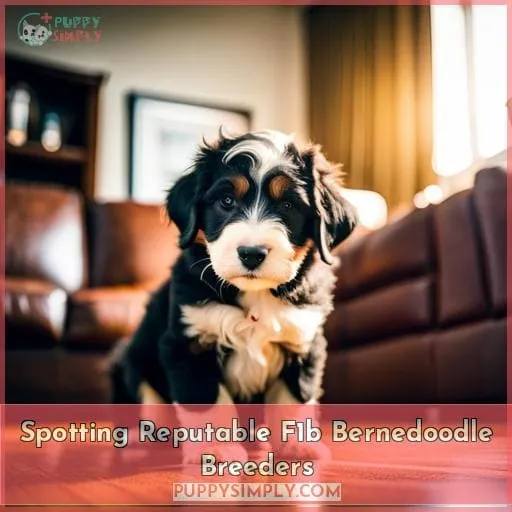This site is supported by our readers. We may earn a commission, at no cost to you, if you purchase through links.
 Do you dream of a four-legged friend that’s just as unique and special as your family? The F1b Bernedoodle may be the perfect pup for you! This dynamic doodle is a cross between an F1 Bernedoodle and a Poodle, making them hypoallergenic with curlier coats to boot.
Do you dream of a four-legged friend that’s just as unique and special as your family? The F1b Bernedoodle may be the perfect pup for you! This dynamic doodle is a cross between an F1 Bernedoodle and a Poodle, making them hypoallergenic with curlier coats to boot.
Get ready to learn all about this cuddly companion – from their temperament, shedding habits, and health needs – so that you can decide if they are right for your home.
Table Of Contents
Key Takeaways
- F1b Bernedoodles are a cross between an F1 Bernedoodle and a Poodle, resulting in a hypoallergenic breed with curlier coats.
- They come in various coat colors, including tri-color, black and white, and merle.
- F1b Bernedoodles are intelligent, loyal, and trainable, but early socialization is important to prevent shyness.
- Grooming and maintenance for F1b Bernedoodles involve regular brushing, occasional trims, and various coat patterns like curly or wavy.
What is an F1b Bernedoodle?
You’re likely familiar with the F1 and F2 Bernedoodles, but if you want a pup that’s hypoallergenic with more Poodle personality traits, then an F1B Bernedoodle is your best bet. The result of breeding an F1 Bernedoodle to a Poodle, this breed has 75% of the latter’s genes in its DNA.
They have curlier coats due to their poodle heritage and come in various colors such as tri-color, black and white or merle. When fully grown they are 24-30 inches tall at the shoulder while weighing 70-90 pounds – leaner than their parent breeds due to their taller stature which resemble poodles more closely.
As for allergens, these dogs shed less than other Bernese Mountain Dog mixes do thanks to them having fewer hairs per square inch on average (i.e., hypoallergenic). Their temperament is loyal like most hybrids yet carries some distinct intelligence from both parents making training easy when socialized early enough.
However, it’s important not only for grooming but also health reasons that you pay attention to your pet’s diet since all portions should be tailored according to age/size because obesity can cause joint problems later on in life.
Finally, potential owners should look out for reputable breeders who prioritize health testing over anything else before taking one home as this will minimize any hereditary issues down the line!
F1b Bernedoodle Characteristics
Experience the intelligent and loyal personality of an F1b Bernedoodle, with a coat that ranges in various colors from tri-color to merle. A combination of Poodle and Bernese Mountain Dog genetics results in a low-shedding coat, which is ideal for those looking for hypoallergenic qualities.
With their taller build resembling that of the Poodle, they are both active and agile dogs, making them excellent running companions when socialized properly. While training challenges may arise due to their intelligence level, patience will go a long way to ensure success.
Exercise needs should be met on a daily basis as this breed loves physical activity such as swimming or long walks. Socialization tips can help avoid any shyness around people or other animals later on down the line.
Grooming-wise, they require regular brushing but also benefit from occasional trims at professional groomers every 6-8 weeks – especially if you opt for one of its popular haircut styles like teddy bear cut or poodle cut!
Finally, it’s important not to dispel common myths surrounding hypoallergenic traits associated with F1b Bernedoodles.
F1b Bernedoodle Appearance
The F1b Bernedoodle’s curly coat is a sight to behold, like an ever-shifting kaleidoscope of colors. The size and build of this hybrid breed can vary depending on the parent breeds, but they generally stand 24-30 inches tall and weigh up to 90 pounds.
Their coats come in various shades such as tri-color, black and white, or merle patterning. In addition to these color variations, their hair also varies from wavy with an occasional curl throughout the body or fully curled around its face for those looking for a teddy bear cut style look.
Grooming requirements are minimal since their hypoallergenic traits help reduce shedding; however, regular brushing will keep it soft and sleek while keeping allergens at bay.
Although there may be potential allergies due to hybrid vigor that arise over time, they remain one of the most sought-after breeds who make great companions in any home setting.
F1b Bernedoodle Temperament
Your F1b Bernedoodle will be loyal, intelligent, and active, with more Poodle-like traits than their Bernese Mountain Dog parent.
It’s important to keep in mind that due to hybrid vigor, they can still inherit hereditary issues from either of the breeds involved in the generation comparison. Therefore, health testing is essential for all parents before adopting an F1b puppy.
With consistent training and socialization, your pup should grow into a loving companion that loves being part of your family while remaining alert enough for guard duty if necessary!
Grooming needs vary slightly depending on coat type, but these pups generally require regular brushing or clipping along with bathing as needed – usually every six weeks or so.
Adopting an F1B Bernedoodle requires research into breeders who prioritize health care and evidence of genetic testing, ensuring you end up with a healthy pet you’ll cherish forever!
F1b Bernedoodle Shedding
You’ll be delighted to know that the F1b Bernedoodle’s curly coat results in minimal shedding, like a gentle summer breeze floating through your home.
To control or reduce shedding, it is important to look into why and how much your pup sheds:
- Genetic makeup – 75% Poodle contributes curlier coats and a poodle-like appearance.
- Grooming Tips – regular brushing helps maintain fur cleanliness.
- Diet – proper nutrition can help lessen excessive hair loss due to nutritional deficiencies.
- Hypoallergenic traits – lack of dander makes them ideal for people with allergies or asthma.
- Shedding patterns – sporadic loose hairs are normal but should not exceed healthy amounts.
The F1B Bernedoodles’ low shedders make them great family pets. They require less maintenance than other breeds when it comes to grooming needs and cleaning up after an active day outdoors! With their hypoallergenic traits, you get all the benefits without any of the sneezing fits!
F1b Bernedoodle Coat Colors
Discover a variety of coat colors with an F1b Bernedoodle, from tri-color to black and white, merle, or tuxedo patterns. The combination of the poodle and Bernese Mountain Dog genes creates unique color combinations like no other breed.
Color inheritance patterns are unpredictable due to crossbreeding outcomes, but generally speaking, the coats can range from solid colors such as browns, blacks, or whites. They can also have bi-colors such as sable/white or brindle/white. Tricolor is the most common in this generation, which is tan with black markings over the eyes and muzzle, plus white stockings on the legs.
Coat pattern variations may include mottled patches throughout the body for merles or tuxedo when one side is dark while the other remains light-colored.
Hypoallergenic traits usually found in F1b’s make them a popular choice for those affected by allergies.
F1b Bernedoodle Lifespan
Experience the F1b Bernedoodle’s longevity with a lifespan of 12-15 years, allowing you to have many memories together. To ensure your pup lives their full life expectancy, it’s essential to understand their grooming needs, exercise requirements, and dietary considerations.
Regular socialization is also key in avoiding behavioral issues that might arise from boredom or lack of stimulation.
Before owning an F1b Bernedoodle, make sure both parent dogs are health tested for common hereditary conditions such as hip dysplasia and progressive retinal atrophy (PRA). A reputable breeder will provide proof of testing before selling any puppy. Despite these precautions, some health issues may still occur due to genetic diversity, so be prepared for unexpected vet visits throughout your pup’s lifetime.
Grooming Needs:
Exercise Requirements:
Dietary Considerations:
Socialization Importance:
These beautiful pups come in various sizes depending on the ratio between Poodle and Bernese Mountain Dog genes used during breeding; however, they all should possess intelligence inherited by both breeds along with loyalty towards their owners – traits that make them great family pets! With proper care, an F1B Bernedoodle can live up to 15 years, ensuring long-lasting companionship when choosing one as a pet.
F1b Bernedoodle Health
As a pet owner, you should take the utmost care in ensuring your F1b Bernedoodle’s health by investing in rigorous health testing. Allergen sensitivity tests are important for identifying potential issues before purchasing or adopting an F1bb Bernedoodle puppy.
Exercise needs and training methods should be discussed with the breeder to ensure proper socialization techniques and behavioral expectations are met. Reputable breeders will also provide information about genetic traits of both parents, as well as any other back-crossing that has occurred during the breeding process, which could affect future generations’ health outcomes.
Additionally, it is vital to research what type of food and supplements best suit their particular size and dietary requirements so they can live a long, healthy life with few medical complications over time from poor nutrition or lack of exercise habits formed early on in life.
Finally, make sure to schedule regular veterinarian visits for vaccinations, checkups, flea prevention treatments, and teeth cleaning appointments when needed, despite how costly these services may be.
F1b Bernedoodle Breeding
When it comes to breeding F1b Bernedoodles, you have two choices: breeding with a Poodle or a Bernese Mountain Dog. The resulting pup can be an exciting blend of both parents’ traits and may vary in size, coloration, and temperament depending on the generation bred.
This hybrid breed is known for its loyalty and intelligence, as well as its hypoallergenic coat that makes them ideal house pets.
Breeding With a Poodle
You can breed a Poodle with your F1B Bernedoodle to create an 87.5% Poodle and 12.5% Bernese Mountain Dog mix. This results in a hypoallergenic coat and more intelligent personality traits that resemble the Poodles’.
These mixes also benefit from hybrid vigor, which makes them healthier than their parent breeds. It combines genetic benefits from both sides of the crossbreed. This is especially true for F2 generations or higher.
Each level reduces the risk of hereditary health issues associated with purebreds.
With proper care and nutrition habits, such as regular vet visits, exercise routines, and high-quality food diets, these poodle crosses have longer lifespans.
Breeding With a Bernese Mountain Dog
Mixing your F1B Bernedoodle with a Bernese Mountain Dog yields an 87.5% blend of the majestic canine, creating a truly awe-inspiring pet!
When breeding with a Bernese Mountain Dog, consider:
- Ancestry – knowing the parent dogs’ ancestry is important for health testing and genetic diversity.
- Hybrid Vigor Insights – crossbreeding benefits include hybrid vigor, which can lead to stronger puppies.
- Parent Breed Influence – understand how traits from each breed will influence the puppy’s coat type, size, and temperament.
- Health Testing Importance – ensure both parents have been screened for any genetic diseases or illnesses.
With careful consideration given to these points before breeding two purebreds together, you can be sure that the results are healthy puppies who exhibit their own unique personalities while still having some recognizable characteristics from their parents.
Spotting Reputable F1b Bernedoodle Breeders
When choosing an F1B Bernedoodle, make sure you look for a reputable breeder who prioritizes health and care. Do your research on customer reviews and the ethical practices of breeders to ensure they follow strict health testing standards and provide proper parent dog care.
Genetic diversity is important too; avoid puppy mills or farms that mass produce puppies to help reduce hereditary issues down the line. The cost of an F1B Bernedoodle can vary widely depending on coloration, size, etc.
To guarantee a healthy pup with good quality genes and loving parents, ask about genetic tests performed in both breeds used in breeding as well as medical records from past litters bred by them.
Conclusion
A F1b Bernedoodle is simply out of this world! Not only is this delightful crossbreed incredibly smart, loyal, and loving, but they’re also hypoallergenic and have beautiful coats in a variety of colors.
From tri-color to merle, these doggos will capture your heart with their fluffy coats and outgoing personalities. F1b Bernedoodles have a lifespan of 12-15 years. With the right care and nutrition, they can easily reach their full potential.
If you’re looking for a new companion, an F1b Bernedoodle is a great choice due to their superior intelligence and affectionate nature. Just be sure to research the breeder you select and look for evidence of health testing to ensure the pup you bring home is healthy and happy.


